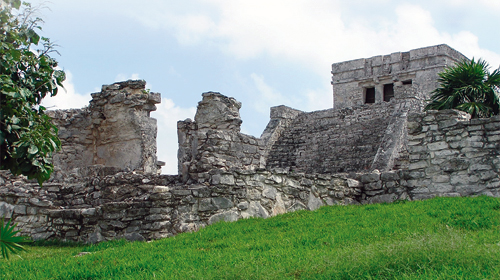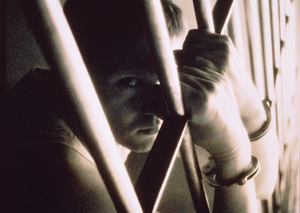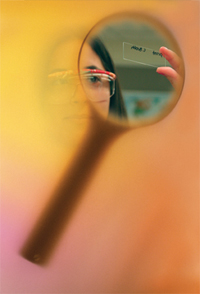
Tour of the Courses
TCNJ students sample academic delicacies across disciplines
by Mark Gola
Thomas Edison once said, “Restlessness and discontent are the first necessities of progress.” Those who stand still in flattery of their being begin a gradual slide toward mediocrity.
TCNJ has taken heed of Edison’s words, and rather than rest upon its laurels has incorporated both meticulous planning and boundless vision into a curriculum that whets the intellectual appetites of its students and faculty members. Each of the College ’s seven schools offers innovative classes that make for a tempting academic menu. Check out the following courses as an appetizer, and check out the "Related Links" at right for more courses.
Immersion Excursion
Mexican Seminar is a course taught by Joe Goebel, assistant professor in the Department of Modern Languages. The program offers students an opportunity to further develop their ability to communicate in Spanish and also study Mexican history, culture, and geography. What better way to achieve those objectives than a three-week immersion in the Yucatan Peninsula, where students see, hear, smell, taste, and touch what they have studied?
We're trying to instill curiosity in the students to continue their education and also develop a thirst for knowledge.
The trip is taken after final exams and focuses on studying the Mayan culture. The class of 20 students and Goebel visit the famous Mayan cities of Calakmul, Uxmal, Chichen Itza, and the capital city of Merida. They spend time in the jungles of the southern Yucatan and the fishing villages of the northern coast, exploring caves, taking horseback rides through haciendas, and attending celebrations like Merida en Domingo. It ’s a whirlwind of language and cultural learning for students, many of whom claim to have learned more Spanish in three weeks than in high school and college courses combined.
“I tried to create a concept where the students are learning Spanish and content simultaneously, ” noted Goebel. “We experience different parts of their culture in big towns, like Merida, and also small local towns. They see and do things they probably never would have imagined doing.”
Without question, exploration is a steady component to the trip. A late-night quest for a jaguar sighting is the type of journey Goebel is known to organize during downtime. One brave student rappeled 50 feet into a cistern known as a cenote to take a swim in an underground cave holding natural waters beneath the surface. “Once she went down and was so excited, everybody wanted to rappel down,” recalled Goebel.
A tradition that has evolved through this annual trip is a baseball game between the American students and local Mexicans. Goebel collects bats, balls, gloves, and other equipment during the year and donates it to the Mexican residents each visit, after the game between students and locals. This provides another event for interaction with locals in a casual atmosphere, where students learn more about the language and culture.
“We’re trying to instill curiosity in the students to continue their education and also develop a thirst for knowledge,” Goebel said. “We want to inspire them to continue to do things like traveling abroad. When you can broaden their minds, it ’s the greatest reward for a teacher.”
Power of the Pen
Lynn Goedecke, adjunct professor, developed the concept for a course titled Wrongful Conviction: Causes and Remedies, which inspires and generates intrigue among her writing students.
“Wrongful conviction is a topic that’s interesting to everyone,” Goedecke said. “It teaches students the importance of research and persuasive writing. Everyone writes better when they ’re engaged in the material they’re writing about.”

Wrongful Conviction: Causes and Remedies
© Christian Schmidt / zefa / Corbis
Currently, there are hundreds, possibly thousands of people serving prison sentences who are not guilty of the crimes for which they were convicted. Many are on death row. The course examines issues and problems with the criminal justice system that led to the conviction of the innocent. Throughout the course, Goedecke teaches students methods to achieve greater depth and quality of research. In doing that research, she hopes students analyze the readings, inherit the skills they absorb through other polished writers, and incorporate those traits into their own presentations.
“Today, kids are brought up using Internet searches and look for quick bites that tend to be poorly written, ” said Goedecke. “There is a big difference between scholarly and non-scholarly resources. We want them to research quality writing and then present their own persuasive arguments in a useful and articulate manner. ”
A feature of the course has students watching three films pertaining to wrongful conviction. The first is a case of youths from Florida wrongfully accused of murder. The second is about an individual who spent 11 years in prison before DNA evidence proved that a witness was incorrect in identifying the person as the perpetrator. The final film chronicles the events of a wrongfully convicted criminal who is set free and how that particular state attempts to rectify its erroneous judgment.
“While it’s not a criminal justice course, those who have interest in that field learn that the ability to write is critical, ” said Goedecke, who has a degree in law. “Writing is the most important skill that you can have in law.”
Not Your Father’s Science Class
Any student who is interested in reversing a wrongful conviction through DNA evidence should register for CHEM 360: Forensic Chemistry. John Allison, professor and director of forensic chemistry, developed the forensics program at TCNJ after teaching for 25 years at Michigan State University. This course would make CSI fans go wild. It discusses chemical aspects of forensic science, such as detection of latent or hidden evidence (fingerprints, markers of counterfeit money and document authenticity, as well as genetic materials).

A Forensic scientist looks for the quick answer. A Forensic chemist studies all the components.
© David Wasserman, magnifying glass;
© Lors Studio, student in lab.
Students take part in different types of labs, studying compounds and becoming familiar with instrumentation. There are conventional experiments designed to give students experience with a specific method, and there are labs where students conduct original research on misunderstood topics.
“There is a difference between forensic science and forensic chemistry,” noted Allison, who designed all the labs himself. “A forensic scientist looks for the quick answer. A forensic chemist studies all the components.
“We have fun in labs and try to make it different every week. I set up small crime scenes that they have to investigate. ”
This past summer, 10 TCNJ students received internship positions at the New Jersey State Police Laboratory in Hamilton. Allison has established an exclusive relationship between TCNJ students and the New Jersey State Police due to the excellence of the forensics program. Two TCNJ undergraduates also participated in undergraduate research in forensic chemistry, supported by a National Institute of Justice grant.
“We’re doing some studies on a chemical called luminol,” continued Allison. “If you spray it on the surface of blood, it reacts and fluoresces in blue light. So if a criminal tries to clean up blood after a crime, not only will you see the blood remnants glow in the dark, but also the wipe marks. ”
Opening Doors and Eyes
Human Ability—Unplugged is a course so innovative that it was featured in The Chronicle of Higher Education. The course was originally designed for students to explore models and theories that examine social, political, cultural, and economic factors that define disability and determine personal and collective response to difference. Now, approximately one-third of that class is comprised of students with varying degrees of developmental and intellectual disabilities. Those Career and Community Studies (CCS) Program students are infused into the classroom with typical college students.
“We’ve taken the original concept and integrated the CCS students into the course,” said Professor Jerry Petroff. “In this type of class, everybody wins. The study of liberal learning increases cognitive development in the CCS students. For the typical college students, they hear firsthand what people with disabilities go through. Hearing stories from a person ’s mouth rather than reading or being lectured to about it has a more profound impact. ”
In addition to traditional studies, classroom discussions, and online chat sessions, there are team projects where students collaborate in small groups on interview assignments, book and film reviews, and special topics/issues papers. The class also takes a field trip to Pure Vision Arts in New York City, the premier studio for artists with developmental challenges.
“Students view people with disabilities with greater comfort and humanity after taking this course,” Petroff added. “So…a future engineer can become more sensitive to building structures that serve disabled people…The possibilities are endless.”



















